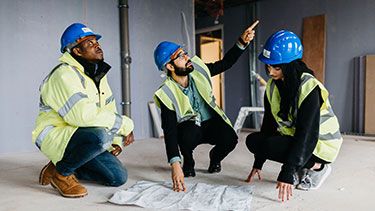Semester 1
Interactive Learning Skills and Communication
Throughout this module, you will learn the academic skills needed for success at a UK university, such as:
- Time management
- Public speaking techniques
- Appropriate language styles
- Professional communication and presentation
- Researching and referencing techniques.
Numerical Techniques 1
This module will introduce you to basic mathematics and mathematical applications – including equations, algebraic problems and trigonometry.
Physics 1
This module defines the basic laws of physics. You will learn how to describe the fundamentals of mechanics and thermofluid mechanics.
ICT Skills
This module will introduce you to the concepts of ICT skills, including applications and reporting mechanisms.
Semester 2
Numerical Techniques 2
This module covers a variety of numerical techniques associated with basic number theory, including:
- Cartesian coordinates
- Indices
- Logarithms
- Polynomial, quadratic and simultaneous equations
- Geometric progressions.
Design Concepts
This module will introduce you to design, the importance of design, and the fundamentals of technical drawing.
Programming Techniques
This module covers the fundamentals of programming, how it is used, and how it contributes to the engineering process and solves engineering problems. You will also learn about the purpose and processes of object-orientated programming, as well as gaining an introductory understanding of Java.
Physics 2
This module will define the key concepts of physical science in an interdisciplinary context. You will also explore physical laws and their relevance to technology, engineering and environment principles.

